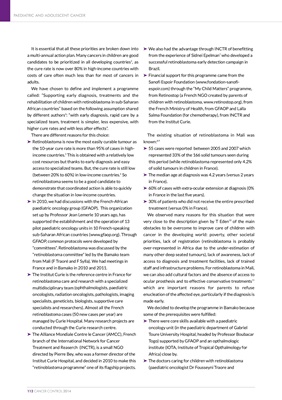
PAEDIATRIC AND ADOLESCENT CANCER
CANCER CONTROL 2014 113
ophthalmologist Dr Fatoumata Sylla) had the
determination to change the situation with the support
of their department heads.
The programme included:
‰ Approval by the authorities, particularly by the ministry
of health and by the directors of the hospitals (for
Bamako, the University Hospital Gabriel Touré and IOTA).
‰ Improvements in early diagnosis with:
- Information in health centres for doctors (general
practitioners and paediatricians) and other health
personnel (nurses, midwives, technicians) on the
symptoms of retinoblastoma (leukocoria and strabism),
training for ophthalmologists (36 in Mali with twothirds of them in Bamako)
and for ophthalmology
technicians (113 in Mali in regional hospitals and some
health centres) in the identification of suspected cases
for referral to IOTA.
- Information for all parents using posters (Figure 1)
designed from existing models in France and Brazil and
also through national campaigns to fight blindness on
radio and TV in French and in the Bambara language.
- An effective response at different stages of care in
developing the capacity to take rapid and effective
action. This means ensuring:
• access to a specialized ophthalmologic consultation at
IOTA for children with suspected retinoblastoma with
the possibility of retina examination (ocular fundus)
in less than one week;
• access to ocular ultrasound and CT-scanning and
NMR imaging (when possible in Bamako);
• the possibility of surgery (enucleation) at the early
stage in less than a week;
• systematic ocular prosthetic rehabilitation (training of
a person on site and at the Prothelem company in
Paris);
• consolidation of pathology (training of a pathologist
for paediatric oncology pathology in Paris with the
help of GFAOP);
• when necessary, access to chemotherapy (through
GFAOP by providing the necessary cancer drugs) and
to radiotherapy (when available in Bamako);
• the establishment and development of conservative
treatments for bilateral cases (training of an
ophthalmologist in Institut Curie, Paris, for thermochemotherapy
techniques, and the acquisition of
necessary materials such as a laser) with the
possibility of follow-up under general anesthesia for
ocular fundus.
‰ Financial support for the poorest families (to limit
treatment interruptions).
‰ Facilitating research activities around retinoblastoma
(beginning with epidemiological studies on the true
incidence of retinoblastoma and on the identification of
specific risk factors) through the network of reference
centres established in sub-Saharan French-speaking
countries treating nearly 200 new cases per year by the
end of the programme.
‰ Systematic registration of all cases of retinoblastoma
from a common chart between paediatric oncologists and
ophthalmologists with regular evaluations according to
previously defined indicators (this was embodied in interinstitutional agreements supported by
the French
Ministry of Health).
The programme was officially launched in Bamako on 5
November 2011, during a visit from professionals including
an ophthalmologist, a radiation oncologist, a paediatric
oncologist and an ocular prosthetist. Over three days, the
programme was finalized: there were discussions with the
authorities, a course on retinoblastoma and a formal meeting
Figure 1: Poster for parents